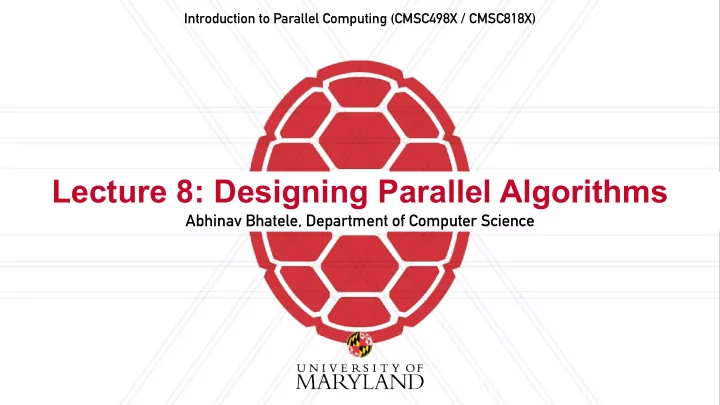

Introduction to Parallel Computing (CMSC498X / CMSC818X) Lecture 8: Designing Parallel Algorithms Abhinav Bhatele, Department of Computer Science
Announcements • Assignment 1 has been released and due on October 5 • Project descriptions are due on September 28 • Quiz on September 30, due on October 1 Abhinav Bhatele (CMSC498X/CMSC818X) LIVE RECORDING 2
Writing parallel programs • Decide the serial algorithm first • Data: how to distribute data among threads/processes? • Data locality: assignment of data to specific processes to minimize data movement • Computation: how to divide work among threads/processes? • Figure out how often communication is needed Abhinav Bhatele (CMSC498X/CMSC818X) LIVE RECORDING 3
Prefix sum • Calculate partial sums of elements in array • Also called a “scan” sometimes pSum[0] = A[0] for(i=1; i<N; i++) { pSum[i] = pSum[i-1] + A[i] 1 2 3 4 5 6 … 1 3 6 10 15 21 … Abhinav Bhatele (CMSC498X/CMSC818X) LIVE RECORDING 4
Parallel prefix sum 2 8 3 5 7 4 1 6 Abhinav Bhatele (CMSC498X/CMSC818X) LIVE RECORDING 5
Parallel prefix sum 2 8 3 5 7 4 1 6 2 10 11 8 12 11 5 7 Abhinav Bhatele (CMSC498X/CMSC818X) LIVE RECORDING 5
Parallel prefix sum 2 8 3 5 7 4 1 6 2 10 11 8 12 11 5 7 2 10 13 18 23 19 17 18 Abhinav Bhatele (CMSC498X/CMSC818X) LIVE RECORDING 5
Parallel prefix sum 2 8 3 5 7 4 1 6 2 10 11 8 12 11 5 7 2 10 13 18 23 19 17 18 2 10 13 18 25 29 30 36 Abhinav Bhatele (CMSC498X/CMSC818X) LIVE RECORDING 5
In practice • You have N numbers and P processes, N >> P • Assign a N/P block to each process • Do calculation for the blocks on each process locally • Then do parallel algorithm with partial prefix sums Abhinav Bhatele (CMSC498X/CMSC818X) LIVE RECORDING 6
Parallel Sorting • Sorting is used in many HPC codes • For example, figuring out which particles/atoms are within a cutoff radius • Two broad categories of parallel sorting algorithms: • Merge-based • Splitter-based Abhinav Bhatele (CMSC498X/CMSC818X) LIVE RECORDING 7
Review QuickSort • Choose a pivot element from the unsorted list • Move all elements < pivot before the pivot and all elements > pivot after the pivot • Recursively apply this to the sublists before and after pivot Abhinav Bhatele (CMSC498X/CMSC818X) LIVE RECORDING 8
Sample Sort • Generalization of QuickSort • Instead of selecting one pivot, we select s-1 samples randomly • This provides us with s-1 “splitters” • Once sorted, these s-1 splitters create s buckets • Keys are then placed in the appropriate bucket • Call sample sort or quick sort recursively Abhinav Bhatele (CMSC498X/CMSC818X) LIVE RECORDING 9
Parallel Sample Sort • Assumption: keys are distributed across all processors in the beginning • Sample s keys randomly from each process • Bring all keys s * p keys to one process • select p-1 splitters from this sorted sample • Send all splitters to all processes • Processes exchange data based on buckets • Call some fast sorting algorithm locally Abhinav Bhatele (CMSC498X/CMSC818X) LIVE RECORDING 10
Abhinav Bhatele 5218 Brendan Iribe Center (IRB) / College Park, MD 20742 phone: 301.405.4507 / e-mail: bhatele@cs.umd.edu
Recommend
More recommend